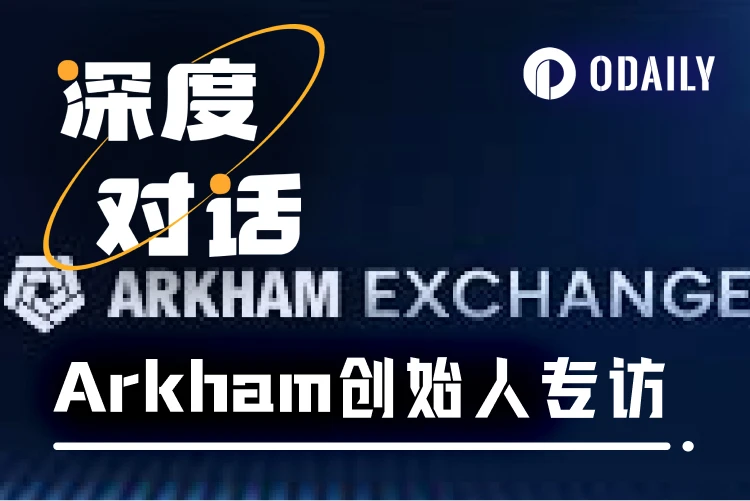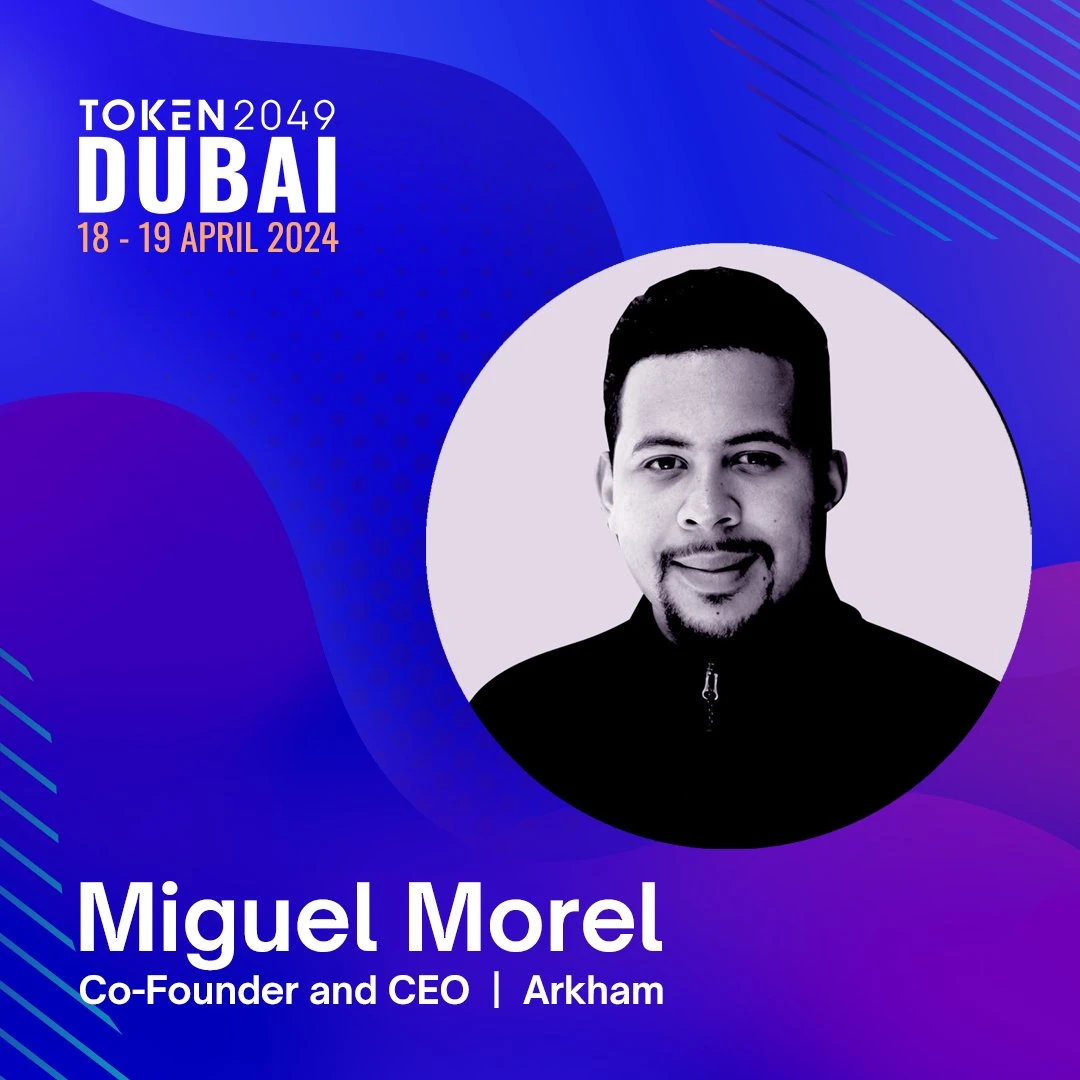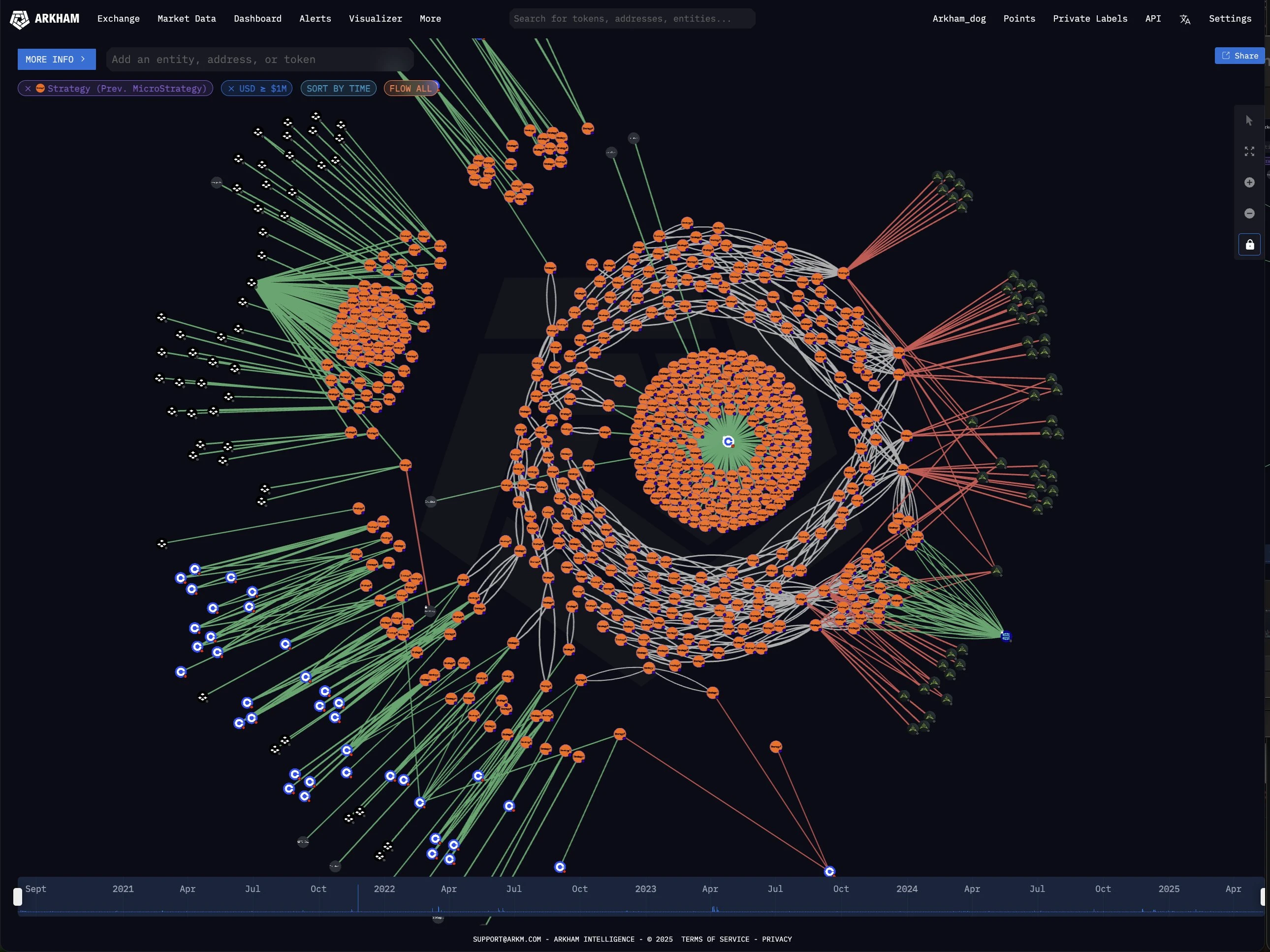原创 | Odaily星球日报(@OdailyChina)
作者|jk

2024 年以前,大多数用户对 Arkham 的印象还停留在“加密情报平台”——它以精准的钱包标签与链上资金追踪能力闻名,曾多次揭露与政府售币、黑客攻击、鲸鱼操作相关的核心地址信息。然而,当 Arkham 于 2024 年正式上线中心化交易所功能,并在全球范围推进合规与扩张后,它的身份开始发生根本性转变。
本次专访中,Odaily 深度对话 Arkham 创始人兼CEO Miguel Morel,回顾了这家新兴公司从成立至今的发展轨迹。他谈及 Arkham 从单纯的链上分析工具向交易平台的过渡、如何构建 AI 驱动的数据标签系统、面对全球监管挑战的策略,以及在用户规模突破 650 万之后,如何继续保持“小而精”的团队执行力。
在这个加密市场重塑信任与效率的时代,Arkham 正试图成为情报与交易合一的入口。他们的终极目标,是让“查看一笔转账”时,人们不再习惯性打开 Etherscan,而是首先想到 Arkham。
Odaily:我们先从基本情况开始聊起吧,可以简单聊聊Arkham和你的创业历史吗?
Miguel Morel:我是在 2020 年 1 月创立 Arkham 的,最初的愿景是为加密货币领域带来更多透明度。在此之前,我在做一个稳定币项目。你知道,当你的产品是一个 ERC20 代币的时候,就会自然而然地想了解用户是谁,谁在使用你的代币。
如果这是一个功能性代币,你还会想要监控市场做市商的行为、代币在交易所上的流入流出情况,以及那些大持仓用户在做什么——他们是在持有?在出售?还是出于某种原因在不断买入?而这些用户到底是谁?
在多个链上,试图识别某些钱包背后是谁、是谁在主导这些地址的行为,这是一件当时非常普遍但难以实现的事。因为像 etherscan 这样的工具,并不能真正做到这些事情。而且你必须在多个区块链浏览器之间来回切换,比如想查 Tron 的信息就得用 TronScan,查以太坊则要用 etherscan。
所以我的想法就是把这一切整合成一个产品,也就是 Arkham —— 一个多链区块浏览器。你可以在上面查看所有主流链上的真实交易活动,我们还会为你分析这些地址背后的实际归属者,并上传相关标签。用户只需要登陆平台,就能免费完成这些研究。
这就是 Arkham 的起点。而在 2023 年 7 月我们正式发布产品之后,我们开始通过朋友、合作伙伴,以及我们认识的一些做市商、交易公司、代币项目团队,把产品分享给他们试用。我们告诉他们,如果你想追踪代币持有人或投资项目的链上动态,这个平台是个不错的选择。
从那时起,我们的用户量开始迅速增长。2023 年 8 月到 12 月之间,我们积累了 1 万名用户。到了 2024 年,从 1 月到 7 月,我们已经突破了 100 万用户。现在,我们的注册用户数已经超过 650 万。
从使用量和流量来看,我几乎可以确定,我们现在已经是加密领域中最大的区块链分析服务商之一了。这就是 Arkham 的起源故事。

本次采访的主人公,CEO Miguel Morel在迪拜Token2049大会
Odaily:我们聊一点关于转型的内容吧;我们的大多数观众所熟悉的 Arkham,还是 2023 年的那个版本。因为现在大部分的曝光,比如与比特币相关的美国监管、ETF 相关内容,甚至像德国政府抛售这类重磅事件,基本上大家都是通过 Arkham 获取信息的;但很少有人了解 2025 年的 Arkham 在交易所服务上面的这条产品线。可以简单聊一下这个转型吗?
Miguel Morel:当然。我们最初是从分析用户群体和整体市场入手的,结果发现,绝大多数使用我们平台的人,其实是加密交易员。虽然也有很多记者会用 Arkham 来研究项目、了解行业动态,我们也确实有不少机构类用户,但如果看我们数百万注册用户中的主体人群,绝大多数是散户或专业交易者。他们会根据我们提供的链上情报去不同平台上买卖加密资产。
于是我们就想,为什么不直接为这些人提供交易服务呢?于是我们在 Arkham 平台上,增加了一个直接交易加密货币的功能,也就是我们后来决定去建设一个中心化交易所的原因。
现在,在 Arkham 的分析平台中,如果你在查看某个代币的页面,或者在追踪某个链上资产转移的动态,不仅可以看到详细信息,还能直接点击“交易”按钮。如果你发现有人在抛售某个代币,而你想做空它,只要点击 Arkham 上的交易按钮,完成 KYC 认证后,在支持的地区你就可以直接进行现货交易或合约交易。
我们在这里找到了一个非常合适的产品市场契合点:大量原本就在使用我们链上情报的交易者,本身就有对安全、可信、透明的交易平台的需求。所以我们现在正是想要满足这类用户,既提供情报与分析,也提供完整的交易服务。
这就是 Arkham 从 2023 年专注于链上情报与分析,发展到 2025 年成为既有情报又有交易能力的一站式平台的整个转型过程。
Odaily:那是什么促使你们进入美国市场的?毕竟这也等于是正面挑战 Coinbase 和 Kraken,对吧?
Miguel Morel:可以这么说。我本身是美国人,Arkham 团队的大多数成员也是美国人,公司也是在美国创立的。我一直认为,美国其实对加密资产的需求一直都存在,只是之前由于监管政策的限制,这种需求被压抑了。
过去几年,美国 SEC 以及相关监管机构对加密行业的态度非常强硬,我们可以随便举出一些例子:无论是 Coinbase、Kraken、Gemini,还是 Ripple 这类代币项目,美国政府几乎都曾主动出手干预、起诉它们。
这就导致了一个局面——全球范围内的加密产品和服务,与美国本土用户实际能接触到的产品之间,存在明显的差距。于是我们决定抓住这个机会:在新一届政府上台之前,我们就已经提前花了一整年时间去搭建好基础设施。而现在,这届新政府对加密行业明显更友好,甚至自己也在推动一些加密相关的项目,这让我们终于有机会以我们理想的方式为用户提供服务。
当然,现在在美国还是不能向散户提供合约(perpetuals)交易,但我相信这是未来的方向。要知道,在美国,股票市场已经拥有各种期货、期权、衍生品等成熟的投资工具。而从信息透明度上看,加密市场其实比股票市场更清晰。
所以当美国市场逐步开放、监管变得清晰且允许项目合规运营时,我们希望能够站在这个浪潮的最前线,为美国用户提供完整的产品和服务。
Odaily:我能不能理解为,你们未来肯定会继续从Arkham现在已经覆盖的 17 个州,逐步扩展到全部 50 个州?
Miguel Morel:没错,这正是我们的目标。
Odaily:你刚才提到,很多交易者从情报获取自然过渡到中心化交易,这是很自然的流程。
现在有很多做交易的读者在抱怨,自从 FTX 崩盘之后,很多对交易者友好的技术产品也随之消失了。比如 FTX 上曾经支持的代币化股票,还有非常适合高频交易的界面设置和功能,都没有了。
你们是否有计划去满足这部分需求?目前有没有具体的技术功能在做这件事?未来有没有这方面的规划?
Miguel Morel:当然,这是我们 Arkham 非常核心的一个优势领域。我们有超过 1,000 家机构在使用我们的情报和分析工具来指导他们的交易行为。
早在我们推出交易所功能之前,就已经有成千上万的顶级交易机构、对冲基金和做市商(包括传统金融机构和原生加密机构)在使用 Arkham 的数据。这类用户对我们而言可以说是我们的“基本盘”。
我们跟他们合作主要是通过 API 的形式,深入理解他们在这些产品中真正想要的功能与体验。我们的目标是同时服务两个方向:
一方面是零售用户。我们现在正在开发一款手机端应用,让用户可以在 iOS 或 Android 上直接进行 Arkham 的交易,目前平台还只支持网页版。这是我们面向普通用户的产品方向。
另一方面,我们也在积极完善机构所需的交易能力和流动性配置,为那些资金体量大、交易复杂的机构提供服务。
我们确实在吸取过去那些被用户称赞、但在 FTX 崩盘后消失的产品灵感,也看到很多现有平台在这些方面投入并不够。所以我们非常重视用户的反馈意见,也正是这些反馈驱动着我们的产品决策方向。
Odaily:我可以这样理解未来的用户使用场景吗?比如说,他们正在关注某个加密市场的资产,突然手机弹出一个通知,点进去后就能直接进行交易——可以这样设想吗?
Miguel Morel:这正是我们的构想。虽然可能不会在第一版就完全实现,但最终版本的愿景,就是将我们现有的情报分析系统和交易所功能深度整合。
理想的情况是,用户可以在平台上设置仪表盘、设定链上追踪目标、创建警报,然后一旦触发,就可以立即基于这些实时链上情报发起交易。这是我们对 Arkham 最终产品形态的构想——一个情报与交易无缝联动的完整闭环。

Arkham对于微策略比特币持仓的地址追踪。来源:Arkham
Odaily:那在这个过程中会不会加入 AI 的功能呢?
Miguel Morel:当然会。事实上,Arkham 上绝大多数的钱包标签,本身就是由 AI 自动生成的。
其实早在行业掀起 AI 浪潮之前,我们就已经在招聘数据科学家,构建自己的机器学习模型和启发式算法,用来实现规模化的钱包标签归属识别。比如我们现在在 Arkham Intelligence 平台上已经标注了大约 25 亿个钱包地址——靠人工根本不可能完成这一工作量。
所以你现在在 Arkham 上看到的情报信息、甚至你在 Twitter 等社交平台上看到的 Arkham 数据推送,有 99% 都是由 AI 驱动生成的。
这项 AI 能力已经深度嵌入在我们的产品之中,并被用于提升用户体验。而我们正在开发的移动 App 当然也会继续沿用这一技术路线。
Odaily:你觉得在产品构建过程中有什么好玩或有趣的事吗?
Miguel Morel:我觉得 Arkham 的一些趣事,其实很多都跟我们这个产品本身的定位有关。有些人会觉得挺有意思,也有人会觉得我们做的事情有点敏感、甚至有争议。
比如一直有声音说 Arkham 是“链上天眼”或者“间谍工具”、“曝光工具”之类的。我认为这些说法其实是刻意把 Arkham描绘成一个比实际更有争议的项目。
从我们的角度看,我们做的事情是把链上本就公开、透明、可审计的信息变得真正“可用”。加密行业一直宣称自己比法币体系、比传统银行体系更透明,但实际上长期以来并没有任何一个平台真正把这种透明性转化为用户可以使用的功能。
这本身是区块链的一个底层特性,但以前从来没有人把它“用起来”。而我们可能是第一个真正把这些公开数据做成对交易者、对普通用户有实际帮助的产品,这也是为什么我们能够获得这么多用户支持、形成 Arkham 社区。
当然,也还是有一部分人反对我们,尤其是那些专注于隐私的人。他们可能更强调“隐私”这面,但往往忽略了加密技术的另一面——也就是公开透明、可审计。
我们认为这两者是一个硬币的两面。虽然他们在做“隐私”那一面,而我们是在做“透明”这一面。但这并不意味着我们就是对立的。虽然有时候会因此遭遇一些“敌意”,但我们始终相信自己在做的是对整个行业有益的事情,也在持续向外界证明我们的价值。
Odaily:刚刚你提到的内容也其实就是我原本准备问的另一个关键问题——“你们到底是怎么做到的?”比如,你们有时候能把一个黑客事件中涉及的所有地址都总结归纳出来,并把它们关联到其他事件上;又比如你们还能追踪到美国、德国政府等机构涉及的钱包地址,或者追踪到与 Trump(特朗普)等名人相关的钱包——这都是非常复杂的链条,如你所说,完全不可能靠人工完成。
这也是我们用户最常问的问题之一:你们是怎么获得这些信息的?怎么保证它是准确的?我们又为什么要相信 Arkham 提供的数据?
Miguel Morel:我们的信息来源有很多种。但 Arkham 最核心的数据来源,其实就是区块链本身。
区块链的数据是完全公开、透明、可验证的。地址之间从来不是孤立存在的,它们总是与其他地址发生联系。一个新地址如果没有收到任何资产,那它就是没有意义的。而一旦它接收到资金,这些资金就一定是来自其他地址的,这种“资金流向”构成了我们识别和关联地址的基础逻辑。
所以我们在做的,是系统性地追踪加密资产的流入和流出,研究它们从哪里来、到哪里去。这些流动关系背后,其实蕴藏着大量可以推断的信息,比如某个项目的内部人员是谁、哪些是交易所的热钱包或冷钱包。
除了链上的流动数据,我们还会结合链下的信息来源,比如法庭文件、政府报告、监管文件等。举个例子,如果 MicroStrategy 发布公告说他们在 1 月买了 1 亿美金的比特币,3 月又买了 1 亿,12 月再买了 5 亿,我们就可以去链上查找是否有符合这个时间与金额模式的钱包群组。把链上与链下数据结合,通过机器学习和启发式算法,我们就能推断出这些地址归属,并进行标注。
除了链上数据,我们还会结合公开信息,比如法庭文件、政府报告、SEC 披露材料等。例如:MicroStrategy 公开说他们在某年 1 月买了 1 亿美元比特币、3 月又买了 1 亿、12 月再买了 5 亿。那么我们就可以回链上找出在这些时间点上有相应规模转账的地址群组,进行模式匹配。Arkham 所做的事情,就是把这些链上数据和链下信息结合起来,用我们构建的机器学习模型与启发式规则去打通它们,最终生成地址标签。
最关键的一点是:这些信息都是公开的。
任何人都可以在 Arkham 平台上看到这些标签数据,和我本人看到的信息是完全一样的。如果有人发现了错误,也可以提交反馈。而且,我们追踪的大多数都是知名交易所、基金、富豪的钱包,有时候在我们标签生成后,还会有记者报道这些钱包。这些被标记的主体本人几乎没有人向我们提出异议。
我做 Arkham 到现在已经五年了,真正有人来找我们说:“这个标签错了,不是我” 的情况,我一只手就能数得过来。
这也从侧面证明了 Arkham 平台标签的准确性与影响力。有时候我们甚至在链上标注某个地址之后,过了很久才有第三方的信息佐证这个地址的真实归属。所以这个过程不仅准确,而且还经常领先。
Odaily:在 Odaily,我们观察到一个明显的趋势:2023 年之前,美国监管环境非常严厉,SEC 四处起诉,尤其是对那些在美国提供服务的加密企业。而自从特朗普重新回到政治核心之后,监管明显宽松了许多。SEC 现在也开始倾听行业声音,态度开放得多。
你怎么看目前的监管格局?未来可能会走向哪里?Arkham 会怎么应对呢?
Miguel Morel:我认为整体来看,监管环境对加密行业依然是偏谨慎甚至怀疑的。
就以我们自身为例,目前我们只在美国 17 个州开展业务,如果要全面运营,还需要向其他州提交申请,获取货币转移牌照(MTLs)等各种许可,确保在法律允许的框架下合规运营。
而放眼全球,各国对加密货币的监管规则差异巨大。有些司法辖区完全不允许提供合约类产品;有些则只允许以“反向主动申请”(reverse solicitation)的方式接入用户,但不允许做直接市场营销。这就导致整个行业面临一套非常碎片化的、复杂的合规挑战。
尽管如此,我认为大趋势是积极的,尤其是美国正在逐步推进更具建设性的加密监管制度,这会对全球带来示范效应。很多国家之所以监管严苛,是因为它们在金融体系上高度依赖美国、世界银行、国际货币基金组织(IMF)等国际机构,这些机构某种程度上决定了什么在全球是“合规”的、什么是“不可接受”的。
因此,如果美国开始向加密资产释放善意,其他国家也将逐步跟进,放宽政策、提升包容度,从而让加密生态系统和创业者能够真正健康成长。
至于 Arkham,如果让我重新来过一次,我依然会选择同样的路径,重复同样的策略,继续专注于我们正在做的事情。
Odaily:那你觉得在创业过程中,最大的难点是什么?除了我们刚才说的合规问题,还有哪些挑战?
Miguel Morel:招聘。招聘确实是一个非常大的难题。想要找到聪明、上进,并且愿意以我们对 Arkham 的要求标准来工作的优秀人才,是非常不容易的。
我们是一个精干、高效的创业团队,不希望陷入官僚主义,也不想变成那种庞大、臃肿、死气沉沉的大公司。我们希望保持小而精的状态,保持活力,持续打造优秀的产品。而要做到这一点,唯一的办法就是只招顶尖人才,真正的 A+ 级别成员。
但当你真的把招聘标准设定在这个高度之后,很快就会发现,真正符合这个标准的人非常少。你很快会用光你的人脉资源。你也会意识到,根本不可能通过 LinkedIn 或冷启动邮件招到这样的人。甚至是通过我们官网提交申请的大多数人,其实也达不到这个标准。他们只是普通人,在找一份工作,但不是在寻找一个能够成为人生使命的事业。
而我们要找的人,必须是愿意把这份工作当成一生的事业和追求的人。现在我们的团队大约有50名成员,从申请量来看,我们收到的简历很多,但真正能够被我们录取的人极少。这也是我们创业过程中遇到的最难的事情之一。
Odaily:如果谈到竞争,你怎么看现在的竞争环境?毕竟市场上有成千上万的中心化交易所,有的定位比较泛,有的是面向专业交易员的。你怎么看待竞争对手?
Miguel Morel:我觉得现在我们最大的竞争对手,其实是我们自己。
我们需要不断打磨自己的产品,让它变得越来越好;我们需要持续找到合适的人才;同时也要保持团队的精干与节制。这就是我经常跟团队说的——我们最大的战斗,是与自己作战,是与惰性作战。
很多时候,当一个项目初步取得一些成绩,比如我们现在在 Twitter 上已经有上百万关注者,平台有几百万注册用户,这种阶段容易让人产生“可以歇一口气”的心态。但真正要做大业务,不能停下来。所以最关键的,是不断提醒自己和团队,不能满足于眼前的成就,而是要持续推动业务向前。
至于外部竞争者,目前最大的对手仍然是传统的中心化交易所。这些交易所虽然拥有庞大的用户基础,但普遍存在严重的监管包袱,同时在用户体验方面,尤其是对代币项目方、做市商和大型交易者来说,往往做得很差。
所以我们的目标,是为这些用户群体提供一种彻底更好的替代方案——无论是产品体验,服务水平,还是交易透明度。
Odaily:那我们聊聊链上情报这一侧的竞争:现在市面上显然有了越来越多的链上数据分析工具。你怎么看待情报分析这块的竞争?
Miguel Morel:说实话,虽然现在市场上出现了不少名字,但这些平台的实际流量都很低,尤其是跟我们在社交媒体、官网和平台上获得的用户互动量比起来,差距很大。
在我看来,我们真正的竞争对手,其实不是这些“情报类”平台,而是像 Etherscan、TronScan、SolScan 这些传统的区块链浏览器。它们的用户量和访问量远高于大部分链上分析工具。
所以对我们来说,我们真正想超越的,是这些浏览器级别的产品。就拿以太坊举例,现在如果你转账一笔 ETH,别人问你“给个证明”,你大概率会发他一个 Etherscan 链接。而我们的目标是让人们未来发送的是 Arkham 的链接,而不是 Etherscan 的。这种“默认认知”层级的影响力,才是我们真正要对标和追求的目标。
Odaily:最后一个问题——你们未来 12 个月的规划是什么?有没有什么关键节点值得期待?
Miguel Morel:当然有。我们接下来的目标是进入更多国家和地区,尽可能扩大我们服务的司法辖区范围。
我们目前优先考虑的是对加密行业更友好的市场,但我们也希望去挑战那些监管比较严格、但市场规模巨大的地区,并在合规的前提下正式提供服务。比如说,阿联酋的 VARA 牌照就是我们路线图上的一个重点,我们正计划推进这个方向,从而进一步进入中东市场。
免责声明:本文章仅代表作者个人观点,不代表本平台的立场和观点。本文章仅供信息分享,不构成对任何人的任何投资建议。用户与作者之间的任何争议,与本平台无关。如网页中刊载的文章或图片涉及侵权,请提供相关的权利证明和身份证明发送邮件到support@aicoin.com,本平台相关工作人员将会进行核查。




